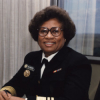Joycelyn Elders

Joycelyn Elders
Minnie Joycelyn Eldersis an American pediatrician and public health administrator. She was a vice admiral in the Public Health Service Commissioned Corps and the first African American appointed as Surgeon General of the United States. Elders is best known for her frank discussion of her views on controversial issues such as drug legalization and distributing contraception in schools. She was fired in December 1994 amidst controversy as a result of her views. She is currently a professor emerita of pediatrics...
NationalityAmerican
ProfessionDoctor
Date of Birth13 August 1933
CountryUnited States of America
Given a choice between hearing my daughter say "I'm pregnant" or "I used a condom", most mothers would get up in the middle of the night and buy them herself.
I don't know how anybody can say that who looks at what's happening to our young people and what's happening to our country, all because of guns. The NRA is putting themselves in a position where people will no longer trust them. They've been trusted in the past, but now their credibility is on the line.
Once I had a professor say to me, "You know you have as much education as a lot of white people." I answered, "Doctor, I have more education than most white people."
My biggest challenge is to educate the American people, to make access to health care available for all, and to make sure that prevention plays a big part in health care. In the case of guns, prevention means we prevent homicides and devastating, expensive gun injuries by preventing those who shouldn't have guns from getting their hands on guns.
Guns kill more teenagers than the other big killers - heart disease, cancer, and AIDS - combined.
I support a total ban on handgun ownership for anyone under eighteen. Uzis should be absolutely banned from entering this country. Automatic weapons of any kind should not be for sale in America. For that matter, toy Uzis should not be available for kids, either. There would be a minimum seven-day waiting period between applying for a gun permit and obtaining a gun.
I want to make it as hard as possible. Gun owners would have to be evaluated by how they scored on written and firing tests, and have to pass the tests in order to own a gun. And I would tax the guns, bullets and the license itself very heavily.
What I can do is to go out and talk about the problems and solutions, make people aware of the scope of the problems, get them to become advocates for a turnaround, and convince them to develop an action plan, targeted to their community, to deal with young people. [They need to] find out what the kids want to do - dances, midnight-basketball leagues.
As long as I was in Washington I never met anybody that I thought was good enough, who knew enough, or who loved enough to make sexual decisions for anybody else.
We know that there are several predisposing factors to gun violence: poverty, lack of education, lack of good parenting, lack of jobs, living in an environment where violence is seen every day, all the time. And children being born to children are likely to have all of these predisposing factors.
Homicide, often involving guns, is a disease that is the leading cause of death for young black men, and the second-leading cause of death for all people aged fifteen to twenty-four. That makes it the leading health issue, particularly when guns are used in combination with drugs and alcohol. And the statistics show that is most often the case.
... if you're poor and ignorant, with a child, you're a slave. Meaning that you're never going to get out of it. These women are in bondage to a kind of slavery that the 13th Amendment just didn't deal with. The old master provided food, clothing and health care to the slaves because he wanted them to get up and go to work in the morning. And so on welfare: you get food, clothing and shelter--you get survival, but you can't really do anything else. You can't control your life.
I've heard Eric Clapner, ... I think it was a wonderful thing that Eric Clapner the musician did...So I think that's the wonderful part about it, but listen - I like Eric Clapner!
We've tried ignorance for a thousand years. It's time we try education.